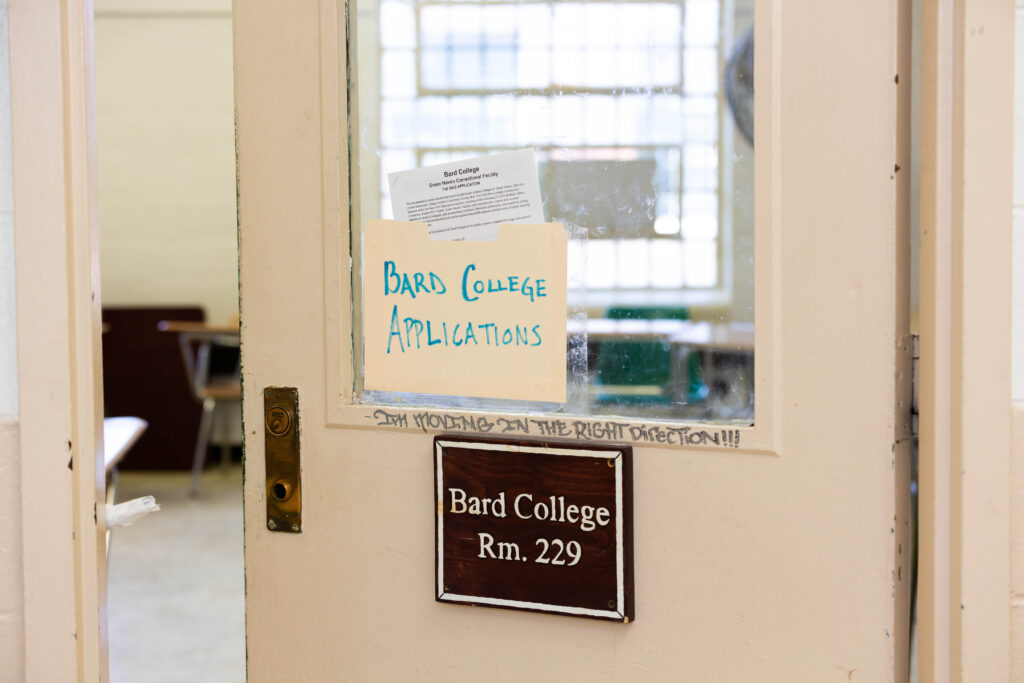
In the U.S., the nation with the largest prison population proportional to population in the world, the idea of rehabilitation has long ago gone from being a stated goal to a completely ignored concept. A study which focuses on people released from prisons in 2005 reveals they were arrested again in the following 9-years at an astounding rate of 83%. Ot But rather than give up entirely on the 2.3 million primarily black and brown Americans who are incarcerated, the Bard Prison Initiative, founded in 2001, has taken a different approach.
The inspiring program, which provides people incarcerated in New York the opportunity to take college-level classes and obtain degrees from Bard College, is the subject of the PBS documentary “College Behind Bars.” Truthdig Editor in Chief Robert Scheer caught up with the film’s director Lynn Novick and Jule Hall, a graduate of the Bard Prison Initiative, in the latest episode of “Scheer Intelligence.”
Hall, who after receiving a degree from the program is now working as a program associate at the Ford Foundation, told the Truthdig Editor in Chief a bit about the program and how it impacted him and his fellow classmates.
“One of the reasons why I joined the program,” explains Hall, “is because I saw that there weren’t many constructive avenues for people to engage themselves on the inside. And my desire was to engage myself, and the Bard Prison Initiative gave me the means to do so by sitting me in a classroom, helping me to see myself as a student, and allowing me to, you know, take a more active role in my own self-development.”
Hall goes on to discuss his project, which takes a look at how “West Germany in 1954 worked to create a multicultural society by using migrant workers called Gastarbeiter,” and how he even learned German during the program. He also describes the powerful class discussions that were made possible through the program, and how his fellow classmates and he were able to grow throughout, despite the dire conditions they faced while in prison.
One of the most incredible facts about the Bard Prison Initiative is how it has reduced recidivism through education. Graduates of the program have a 4% recidivism rate as opposed to much higher rates reported across the country. One of the obstacles to programs such as these, however, are financial, especially in that lower rates of recidivism eats into the prison industrial complex’s bottom lines. Scheer, however, points out why this decline should be desirable to American society as a whole.
“We know that people returning to jail, that’s an expense; this is not a way of saving money,” says Scheer. “And so you actually have here a stunning example of something that works. And there are increasing numbers of conservatives, as well as liberals and so forth, who know that rehabilitation—that, you know, considering people as full human beings with full potential, no matter what happened to them when they were 17 or 27 or 37, […] that there’s something there in each person.”
Near the end of the interview, Scheer also asks Novick what inspired her to work on the documentary series, highlighting how often projects such as this are overlooked in our capitalist society for films that can perhaps garner more prestige or financial reward.
“You are, someone who is very successful,” say Scheer, “and you work with Ken Burns on these different projects, and probably recognized as [one of] the best documentary filmmakers alive […] And you got into this really tough issue, and you put a lot of time into it. [What] got you into this project and what have you learned from it?”
“[The producer Sarah Botstein and I] got the chance to just teach a class in the program,” responds the filmmaker, “and were so inspired by the students, and really exhilarated and also devastated to think about this incredible talent and capacity and intellectual sort of fervor, and then think about where it’s happening and the juxtaposition of those two things. [Our] first reaction was this would be an amazing film. And our second thought was, we don’t have time, we’re busy working on our Vietnam series […] but it really stayed with us.
“[Making the film has] been an incredible privilege,” Novick continues, “and I will never think about education, incarceration, filmmaking, politics, human beings, the human condition, the same way again.”
Listen to the full inspiring discussion between Novick, Hall and Scheer, which touches on the larger issues surrounding incarceration in the U.S. and its connection to slavery and inequality.



